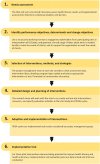The OPtimising HEalth LIterAcy (Ophelia) process: study protocol for using health literacy profiling and community engagement to create and implement health reform
- PMID: 25002024
- PMCID: PMC4105165
- DOI: 10.1186/1471-2458-14-694
The OPtimising HEalth LIterAcy (Ophelia) process: study protocol for using health literacy profiling and community engagement to create and implement health reform
Abstract
Background: Health literacy is a multi-dimensional concept comprising a range of cognitive, affective, social, and personal skills and attributes. This paper describes the research and development protocol for a large communities-based collaborative project in Victoria, Australia that aims to identify and respond to health literacy issues for people with chronic conditions. The project, called Ophelia (OPtimising HEalth LIterAcy) Victoria, is a partnership between two universities, eight service organisations and the Victorian Government. Based on the identified issues, it will develop and pilot health literacy interventions across eight disparate health services to inform the creation of a health literacy response framework to improve health outcomes and reduce health inequalities.
Methods/design: The protocol draws on many inputs including the experience of the partners in previous co-creation and roll-out of large-scale health-promotion initiatives. Three key conceptual models/discourses inform the protocol: intervention mapping; quality improvement collaboratives, and realist synthesis. The protocol is outcomes-oriented and focuses on two key questions: 'What are the health literacy strengths and weaknesses of clients of participating sites?', and 'How do sites interpret and respond to these in order to achieve positive health and equity outcomes for their clients?'. The process has six steps in three main phases. The first phase is a needs assessment that uses the Health Literacy Questionnaire (HLQ), a multi-dimensional measure of health literacy, to identify common health literacy needs among clients. The second phase involves front-line staff and management within each service organisation in co-creating intervention plans to strategically respond to the identified local needs. The third phase will trial the interventions within each site to determine if the site can improve identified limitations to service access and/or health outcomes.
Discussion: There have been few attempts to assist agencies to identify, and respond, in a planned way, to the varied health literacy needs of their clients. This project will assess the potential for targeted, locally-developed health literacy interventions to improve access, equity and outcomes.
Figures



References
-
- World Health Organization. Health Promotion Glossary. Health Promot Int. 1998;13(4):349–364.
-
- Health literacy and the Millennium Development Goals. United Nations Economic and Social Council (ECOSOC) regional meeting background paper (abstracted) J Health Comm. 2010;15(Suppl 2):211–223. - PubMed
-
- Nutbeam D. The evolving concept of health literacy. Soc Sci Med. 2008;67:2072–2078. - PubMed
-
- Department of Health. Self Care - A Real Choice, Self Care Support - A Practical Option. London: National Health Service; 2004.
-
- Commonwealth of Australia. Building a 21st Century Primary Healthcare System: A Draft of Australia’s First National Primary Healthcare Strategy. ACT: Commonwealth of Australia; 2009. [ http://www.yourhealth.gov.au/internet/yourhealth/publishing.nsf/Content/...]
Publication types
MeSH terms
LinkOut - more resources
Full Text Sources
Other Literature Sources
Medical

